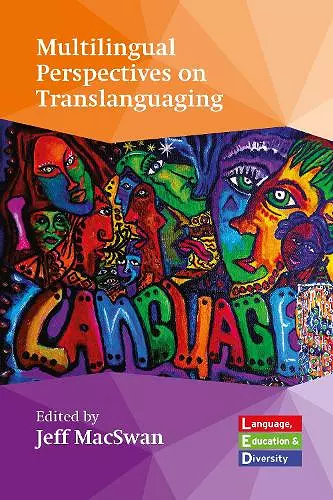Multilingual Perspectives on Translanguaging
Format:Paperback
Publisher:Multilingual Matters
Published:13th Jul '22
Should be back in stock very soon
This paperback is available in another edition too:
- Hardback£125.96was £139.95(9781800415683)

The first book to critically assess the deconstructivist turn in translanguaging
This book brings together a group of leading scholars to critically assess a recent proposal within translanguaging theory called deconstructivism: the view that discrete or ‘named’ languages do not exist. The authors converge on a multilingual perspective on translanguaging which affirms the aims of translanguaging but rejects deconstructivism.
This book brings together a broad, interdisciplinary group of leading scholars to critically assess a recent proposal within translanguaging theory called deconstructivism: the view that discrete or ‘named’ languages do not exist. Contributors explore important topics in relation to the deconstructivist turn in translanguaging, including epistemology, language ideology, bilingual linguistic competence, codeswitching, bilingual first language acquisition, the neurolinguistics of bilingualism, the significance of language naming to Indigenous language reclamation efforts, implications for bilingual education and language rights, and the effects of translanguaging on immersion programs for endangered languages. Contributing authors converge on support for a multilingual perspective on translanguaging which affirms the pedagogical and conceptual aims of translanguaging but rejects deconstructivism. The book makes a valuable contribution to the development of translanguaging theory and will be required reading for scholars and students interested in one of the most vibrant and vital debates in contemporary applied linguistics.
Multilingual Perspectives on Translanguaging provides insightful answers to questions such as the following and more: If translanguaging entails that languages are mere theoretical constructs, why does the term suggest ‘crossing languages’? If they do not exist, why do speakers claim their languages index their community identities? The chapters are theoretically and empirically well-grounded, resulting in a thought-provoking and stimulating book. * Salikoko S. Mufwene, University of Chicago, USA *
MacSwan brings together a powerhouse of established and esteemed contributors to advocate for a multilingual perspective on translanguaging in the study of inter-speaker language variation, codeswitching, and psycholinguistics and practices of language policy, bilingual education, and teacher education. This book is packed with powerful arguments that multilingualism is both psychologically real and socially meaningful. Essential reading for those interested in translanguaging and advocating for social and linguistic justice. * Kendall A. King, University of Minnesota, USA *
This is a very important volume. Because ideologies and conceptualizations of language matter, it will be valuable and thought-provoking for everyone engaged in social justice initiatives that focus on the instruments of expression of minoritized populations. * Guadalupe Valdés, Stanford University, USA *
The brilliance of Jeff MacSwan’s volume lies in its detailed analyses of the always present tensions and contradictions between critical theory and the panoply of empirical research. The authors correctly argue that language liberation does not rest on the erasure of labels that have been used to reproduce linguistic colonialism. What matters most is the keen comprehension of the complexity of achieving conscientization in language de-colonization. This is a must-read book for all language researchers, practitioners, and policymakers. * Donaldo Macedo, University of Massachusetts Boston, USA *
This book is a rich multi-author collection which takes issue with one of the latest developments proposed by translanguaging writers such as Garcia, Li Wei and Otheguy: the suggestion that “named languages’’ e.g French are political constructs rather than psychological realities in the minds of speakers, who have instead a unitary linguistic system [...] a volume which clearly contributes to the advancement of bilingual and multilingual studies
from a rich variety of angles.
...the book offers thoughtful responses to the pressing inquiries about translanguaging with theoretically and empirically diverse points of view. Rather than merely explaining the claims of translanguaging, it seeks to understand it from the perspectives of codeswitching, psycholinguistics, language policy, bilingual education, and teacher education.
* Onur Özkaynak, The Ohio State University, USA, TESOL Journal, 2023 *The true value of this collection is found in the interdisciplinary team of scholars, who across 12 chapters elaborate on a diverse range of topics that cover codeswitching, bilingual language development, first and second language acquisition, duallanguage immersion programs, neurolinguistics, Indigenous language history, and linguicism.
* Kai Greene, California State University, USA, Teachers College Record 2023 *...this book provides a great deal of thought-provoking reading for sociolinguists. It illustrates the diverse sociocultural contexts in which multilingualism and bilingualism are located, albeit illustrated predominantly with examples from the US and the UK. And for those who, like me, considered translanguaging to be largely a pedagogical issue which had unfortunately leaked into theory and developed to challenge important and soundly based concepts like code-switching, this book makes it clear that the issues are much deeper and have more serious consequences.
* Janet Holmes, Victoria University of Wellington, New Zealand, Language in Society *ISBN: 9781800415676
Dimensions: 234mm x 156mm x 20mm
Weight: 590g
368 pages